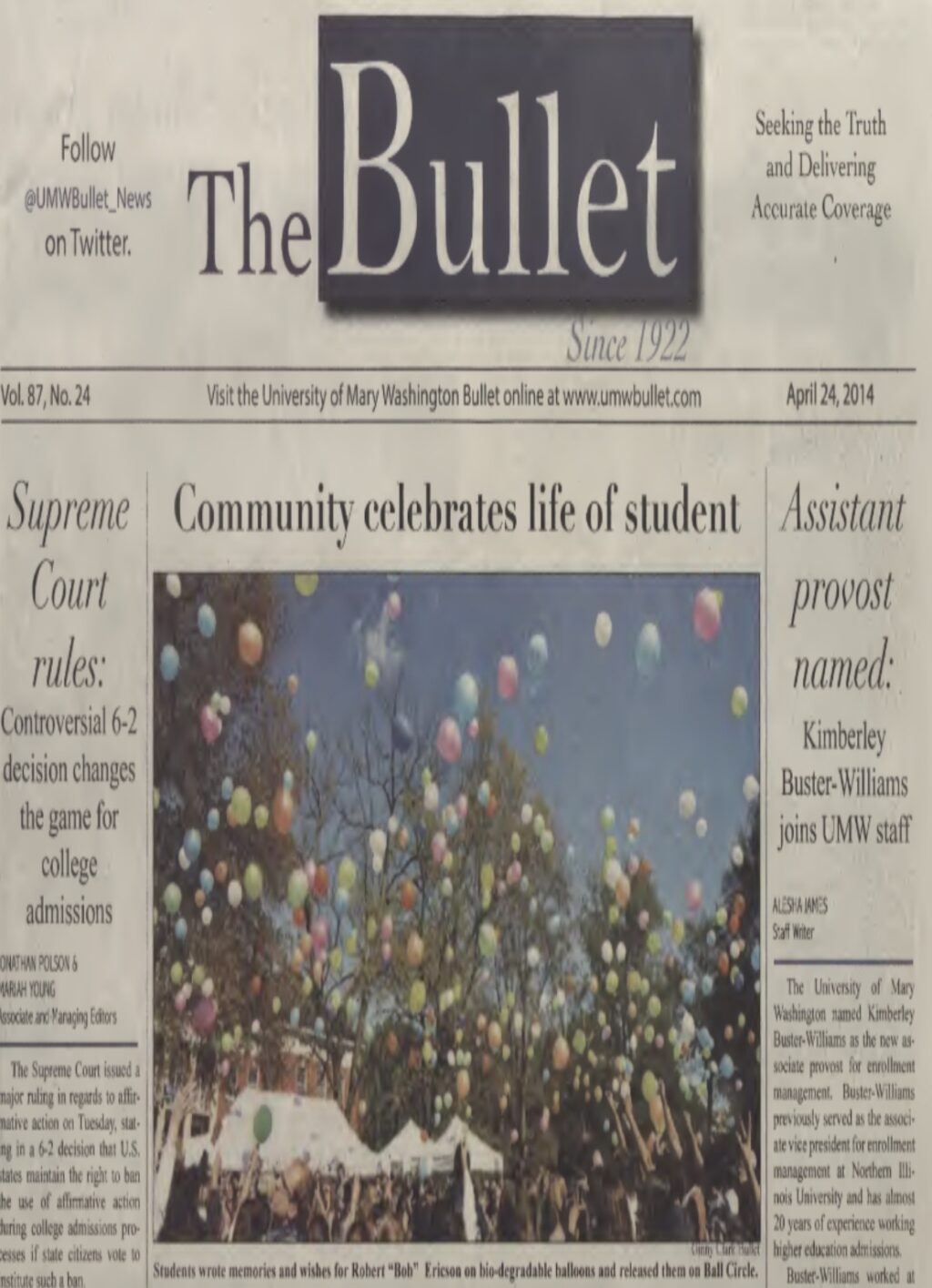The history of The Blue & Gray Press, 2014-2021
5 min read
The last edition of The Bullet, before it became The Blue & Gray Press. The Bullet / University Archives
by ABIGAIL SLAUGHTER
Copy Editor
2014 marked the end of an era for The Bullet, the University of Mary Washington’s newspaper. After decades of being called “The Bullet,” the newspaper was renamed “The Blue & Gray Press,” in an effort to change its image.
Alison Thoet, the paper’s former editor-in-chief, led the renaming campaign alongside two other former head editors—Mariah Young, former managing editor, and Jonathan Polson, former associate editor.
Picture this: it’s the mid-2010’s, a time period known by many Gen “X”s as the Great Recession. At this point, the newspaper had been called The Bullet since the Great Depression. UMW had changed a lot over the years, so why not follow suit and change with the times once again?
“We were doing a really big refresh of the newspaper,” said Hope Racine, former news editor of the paper. “We got a new website, done by Laura [Hanks] (formerly known as Laura Brumfield), changed the paper size to tabloid size… we were refreshing everything.” She figured that a new name would go along with it.
However, there was another reason for a name change. Here’s a hint: sex.
What about sex?
Sexclamations, a small column typically published in the Viewpoints section, was dedicated to discussing sex and other mature content in a less-than-subtle way.
The section had published uncomfortable content before, like, “To Shave or Not to Shave? That is the Question for Both the Girls and Guys” about shaving pubic hair and “As Weather Warms, Temptation Strikes” about outdoor sex. However, The Bullet’s section of Sexclamations published on March 17, 2011, took it much further.
The Bullet published a brief article titled “Warm Weather Brings Short Skirts and ‘Ogling’ Eyes” (ogling is a term used to describe men’s intense gazing at women and gawking at their features in a creepy way). Just after the title, there it was—page 3 of the paper: “When women make the decision to wear their summer clothes, they are perpetuating a terrible, lecherous problem that they usually complain about called the ‘ogling conundrum.’” Yikes.
Although the article was intended to be satire, it was too late—some members of the student body were not happy.
In the following week’s column, some students shared their opinions offering their mixed yet mostly negative reviews of the previous week’s publication. In a letter to the editor, Courtney Turney, a UMW sophomore at the time, said, “Stop objectifying the female body” and was disappointed by the content of the article, stating it is normal for women to wear less clothes when the weather gets warmer.
The backlash that the column received made it to the Free Lance-Star, a local newspaper in Fredericksburg, Va. The Free Lance-Star’s Jeff Branscome discussed some UMW students’ criticism of the article; one criticism was that the column was using rhetoric that is often used when discussing sexual assault—the unfair question of “What was she wearing?” still asked in our sexual assault discourse today.
According to Racine, what she called “shoddy journalism” that some editorial staff wanted the paper to distance itself from also played a part in the decision to rename. Also, the occasional person calling out an article for something small because they didn’t understand journalism compounded the worsening of The Bullet’s reputation. Someone’s always got an opinion.
Controversies like these were the beginning of the end for that column and The Bullet as a newspaper, for that matter.
Two sides of the same rusty coin
How does the song go? “You can change your hair, and you can change your clothes/ You can change your mind, that’s just the way it goes/ You can say ‘goodbye’ and you can say ‘hello’/ But you’ll always find your way back home”? It’s that one Hannah Montana song from childhood that perfectly sums up the challenges that come with rebranding.
The pop star is right!—hear me out. Even if you change how you look, it can be very difficult to truly change your identity and set yourself apart from your past self. This is exactly what happened with The Bullet.
The name “The Bullet” was deeply intertwined with the history of Fredericksburg as a city, which loves their Civil War history. Just west of Central Park, there is a towering statue of a Confederate soldier, and there are four Civil War monuments within a 1.5-mile radius of UMW. Even on the University of Mary Washington campus, there is a war plaque near Combs Hall.
Instead of moving away from this pattern of commemoration of the Civil War, the editorial staff settled on the name “The Blue and Gray Press,” utilizing two colors often associated with the war.
The newspaper faced pushback from alumni. Will Copps, former editor-in-chief of the school newspaper during The Bullet era, did not like the new name.
“I thought the [Blue & Gray Press’s] decision and corresponding association with the confederacy was really strange honestly, even accounting for the history of the city,” said Copps. “It was weird to pick something arguably as or more offensive.”
Copps doesn’t think that the war is all the riverside city has to offer, and he’s right; it’s not all old cannons and Civil War collectibles at antique stores. The new name was just another side of the same rusty coin.
Trust the process?
The Blue & Gray Press was supposed to be an homage to the colors of the university, but Lauren Hanks, former acting online editor for the newspaper, said that for a few years after renaming to The Blue & Gray Press, students still wouldn’t even refer to the newspaper by its new name, making it hard to solidify their new image on campus. Maybe students still wanted a little bit of *spice* in their school publication—they used to have jokes and a sex column to look forward to, and the renaming campaign brought seriousness and “Weekend Weather” to the front page.
“In retrospect, and knowing what I know now about brand changes in general: they take time,” said Hanks.











